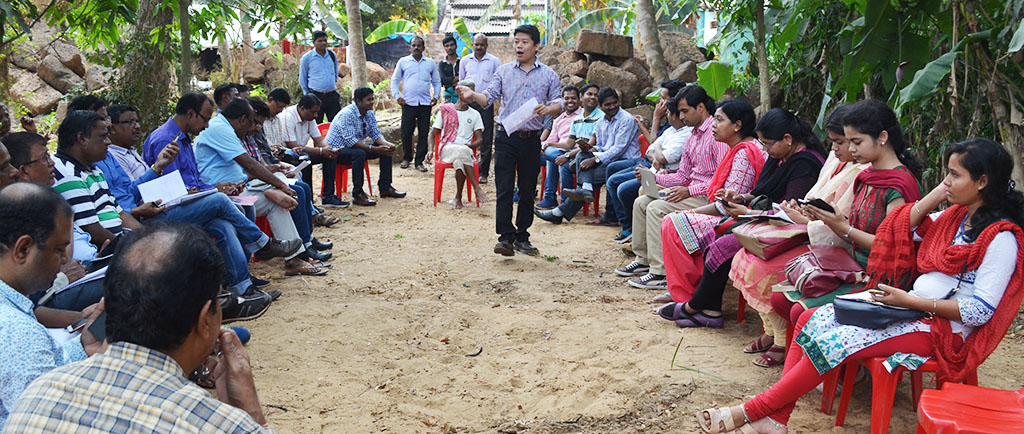Partnering with Government Propels CSISA’s Efforts in Odisha
 The Cereal Systems Initiative for South Asia (CSISA), led by the International Maize and Wheat Improvement Center (CIMMYT) and implemented jointly with International Food Policy Research Institute (IFPRI) and International Rice Research Institute (IRRI), has recently collaborated with the Institute on Management of Agricultural Extension (IMAGE) to strengthen the capacity of extension officers in the state of Odisha. IMAGE is an autonomous body founded by the Government of Odisha in 1997 with a mandate to build capacity of agricultural functionaries across the state’s 30 districts. This partnership reflects a key shift in CSISA’s approach in its third phase to mainstream and support the dissemination of proven sustainable intensification technologies through creation of internal expertise within the national agricultural research and extension system. While IMAGE has the resources – training budget, infrastructure, network of skilled personnel – and a well-planned annual training mandate, CSISA supports as a technical partner facilitating resource persons and demonstrations. This complementary partnership will ensure that the strong momentum created by CSISA is carried forward beyond the project lifecycle.
The Cereal Systems Initiative for South Asia (CSISA), led by the International Maize and Wheat Improvement Center (CIMMYT) and implemented jointly with International Food Policy Research Institute (IFPRI) and International Rice Research Institute (IRRI), has recently collaborated with the Institute on Management of Agricultural Extension (IMAGE) to strengthen the capacity of extension officers in the state of Odisha. IMAGE is an autonomous body founded by the Government of Odisha in 1997 with a mandate to build capacity of agricultural functionaries across the state’s 30 districts. This partnership reflects a key shift in CSISA’s approach in its third phase to mainstream and support the dissemination of proven sustainable intensification technologies through creation of internal expertise within the national agricultural research and extension system. While IMAGE has the resources – training budget, infrastructure, network of skilled personnel – and a well-planned annual training mandate, CSISA supports as a technical partner facilitating resource persons and demonstrations. This complementary partnership will ensure that the strong momentum created by CSISA is carried forward beyond the project lifecycle.
As part of this partnership, a series of trainings of trainers (ToTs) were organized for government partners to out-scale sustainable intensification technologies in Odisha. The master trainers created through this exercise are expected to help create additional trainers within the governmental extension system. The two- to three-day ToTs were conducted both in and out of the classroom. Classroom exercises focused on mutual learning through frequent and open discussion, presentations, videos, print material and data-based evidence gathered by the project. Demonstrations on equipment/machinery, operation, calibration, and best-bet agronomic practices were arranged in real-world situations that involved all participants through practical exercises. The trainings covered mutually agreed upon topics such as using seed-cum-fertilizer drills for direct seeded rice and maize, best practices on nursery management, and cultivation of rabi (winter) season pulses and oilseeds to avoid rice fallows, among others.
“These topics were selected keeping in mind some of the biggest challenges faced by agricultural extension agencies in the state. The training on integrated weed management and herbicide spraying techniques, for example, was especially relevant,” said B. N. Dash, Director, IMAGE. As per the initial agreement, five trainings have been conducted for a total of 157 participants, some of whom have already either conducted further trainings of their own or incorporated the learnings into their existing work plans. “The knowledge gained by our staff will surely be shared in all our future programs at various levels. We have already imparted a training on improved, safer herbicide spraying techniques for farmers,” added Dash.
Feedback from the trainings has been encouraging with IMAGE suggesting additional training topics, including on communication and research platform management skills, and requesting a repeat of the series of ToTs during the next two months to train additional personnel. For future trainings, CSISA also hopes to incorporate more instructional videos on different components and prepare modules and presentations in Odia, the local language. Tracking mechanisms are also being developed to measure the practical impact of the ToTs.
The collaboration with IMAGE is only one of many collaborations planned over the next few years as CSISA looks to align with the Government’s efforts through an overarching partnership with the Odisha Department of Agriculture and Farmers’ Empowerment. As a result of various strategic discussions, four thematic areas have been identified where the scope for synergy and potential impact is greatest. These are: Developing the maize value-chain in the plateau region, rice-fallows intensification, increasing scale-appropriate mechanization, and building capacity on data collection to improve feedback into state planning processes.
CSISA now plans to conduct similar trainings in 11 districts over the course of this year in collaboration with the Department of Agriculture, Regional Institutions on Training and Extension, Krishi Vigyan Kendras, NGOs and private companies to build an extensive network of master trainers on sustainable intensification technologies throughout the state.
This article is authored by Ashok Kumar, CSISA Odisha Hub Coordinator, IRRI and Ashwamegh Banerjee, Assistant Communications Specialist, CIMMYT-India.
